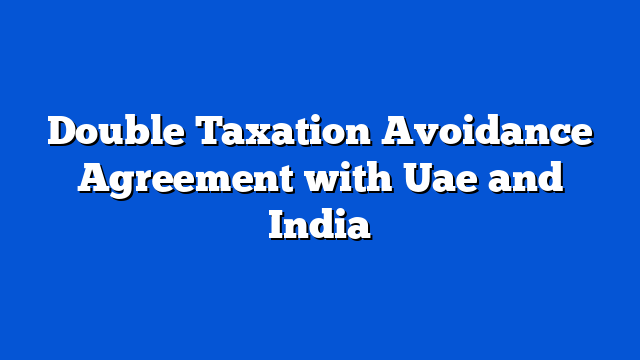Double Taxation Avoidance Agreement (DTAA) is a tax agreement between two countries which aims to avoid double taxation of income earned by individuals and organizations. Recently, the UAE and India have signed a DTAA to provide relief to taxpayers who have businesses or investments in both countries. In this article, we will take a closer look at the new agreement and its implications.
The UAE and India have a strong economic relationship. India is one of UAE`s largest trading partners, with bilateral trade between the countries reaching $60 billion in 2019. Over 3.3 million Indians live and work in the UAE, which is the largest expatriate community in the country. In the past, the absence of a DTAA between the two countries has caused double taxation of income, causing difficulties for individuals and businesses.
The new DTAA will help to ease these difficulties by providing relief to taxpayers in both countries. The agreement offers a range of benefits, including reduced tax rates for certain types of income, exemptions for certain types of income, and a mechanism for resolving disputes between the tax authorities of the two countries. The DTAA also clarifies the rules for determining residency status and provides guidance on the taxation of income from employment, dividends, and royalties.
One of the key benefits of the new DTAA is the reduction in withholding tax rates for certain types of income. For example, the withholding tax rate for royalties and fees for technical services has been reduced from 12.5% to 10%. This will benefit Indian companies that provide technical services to UAE-based clients and vice versa. The agreement also provides exemptions for certain types of income, such as income from pensions and social security payments.
Another important change under the new DTAA is the introduction of the Mutual Agreement Procedure (MAP). This mechanism allows taxpayers to resolve disputes between the tax authorities of the two countries. Under MAP, taxpayers can request the competent authority of one country to consult with the competent authority of the other country to resolve disputes arising from the interpretation or application of the DTAA. This will provide a mechanism for resolving disputes quickly and efficiently, reducing the time and cost of resolving disputes.
In conclusion, the new DTAA signed between the UAE and India will provide relief to taxpayers in both countries and will help to strengthen their economic relationship. The agreement offers reduced tax rates, exemptions for certain types of income, and a mechanism for resolving disputes between the tax authorities of the two countries. It is a positive step towards improving the ease of doing business between the two countries.




